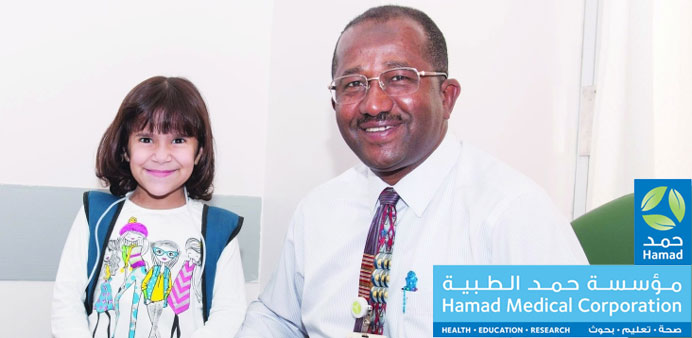Doha
Young patients who are not able to obtain proper nutrition orally are continuing to benefit from the Home Total Parenteral Nutrition (HPN) service, introduced at Hamad Medical Corporation (HMC) in 2011.
HPN service is the only such programme in the Arab region, and allows patients to receive the TPN service at home. Last year, the HPN service was recognised at HMC’s Stars of Excellence Award under the Patient Experience category.
Total Parenteral Nutrition (TPN) prevents malnutrition in patients with intestinal function failure and provides liquid nutrients, including carbohydrates, proteins, fats, vitamins and minerals, through the vein.
Dr Kamal Osman Hassan, senior consultant, Paediatric Gastroenterology, Hamad General Hospital, said that since the service was implemented, ten patients have benefited and no longer require lengthy hospital stays. He added that this number is continuing to grow with three more patients currently undergoing training in preparation for discharge on HPN.
“With the HPN service, our patients now stay at home with their families and enjoy the life that other children have. They can go to school, shopping, outdoor parks and travel with their families; things that were very difficult before the service was introduced,” said Dr Hassan.
Parents of the patients who use the service have praised HPN and the clinical team saying it has truly given their child, and their entire family, a new lease on life. “During the time we needed to stay at the hospital it was very hard because of our commitments with work and our other children. We are much relieved with the home service,” said one of the parents whose child is benefiting from HPN.
Salma al-Marri, the mother of a young patient, Mayassa, who is now nine-year-old, said that before Mayassa was placed under the Home TPN Service she had to stay in the hospital for four years. “The HPN is an excellent service that has truly helped us; because of this service, I no longer have to come to the hospital every day to watch over Mayassa. We just have to come three times a week to pick up the TPN bag, and every month for her medication.”
Prior to transitioning to the HPN programme, both parents and the young patients are provided with training explaining how to administer and connect the parenteral nutrition bag to the intravenous catheter and how to clean it. Nurses from HMC’s home healthcare service visit the patients in their homes regularly to perform checkups and provide additional medical assistance. HMC provides patients with all required equipment for the HPN programme.
Dr Hassan said the service has resulted in a significant reduction in the rate of infection and TPN complications, reducing the need to send patients abroad for bowel rehabilitation and small bowel transplantation.

